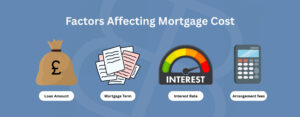How Much Does The Average Mortgage Cost?

Calculating the cost of a mortgage is not a quick straightforward task, whether you’re looking for your first mortgage or to remortgage. There are different types of costs and variables to consider, from interest rates to term lengths, which can change at any time. In this article we explore the current mortgage rates and what to consider when calculating the average cost of a mortgage.
Average Mortgage Interest Rates as of November 2025
| Rate Type | Average Interest Rate | Source |
|---|---|---|
| 2 year fixed rate, 95% LTV | 4.91% | BSA.org.uk |
| 2 year fixed rate, 75% LTV | 4.06% | BSA.org.uk |
| 3 year fixed rate, 75% LTV | 4.02% | BSA.org.uk |
| Standard Variable Rate | 6.81% | BSA.org.uk |
Please note that mortgage rates vary greatly from one lender to another. Different deals will also be available with the same lender for different circumstances, e.g. loan-to-value amount, applicant’s credit history, etc.
There has been a lot of news surrounding the increase in the Base Rate and its potential effects on mortgage rates. The Bank of England (BoE) meets approximately every six weeks to determine whether the Base Rate should be raised, lowered, or remain unchanged.
The Average Mortgage Length
The length of the mortgage is another contributing factor in the cost of the mortgage. In the UK, mortgage terms start from as little as six months and can be as long as 40 years. The most common length of a mortgage is 25 years, but 30, 35, and 40 years are now available with some lenders.
People choose to take out longer terms to lower their monthly payments. This allows them to spread their loan repayments over a longer period. However, it does mean that they will end up paying more interest over the lifetime of the mortgage.
House prices have risen dramatically in recent years, and mortgages over longer terms have increased in popularity. The average UK house price was £286,000 in May 2023, as published by GOV.UK. This rise in house prices has made it much more difficult for people to buy property, particularly with larger deposits now required.
House prices also vary massively depending on the area of the UK, with people in London facing the most expensive house prices and the largest mortgage loans.
See What Our Clients Have To Say...
What’s the Average Mortgage Payment in the UK?
In August 2025, the average mortgage payment in the UK was £1270, according to Finder. This is based on the average house price as of August 2025, the average 2-year fixed mortgage rate, a 15% deposit, and a mortgage length of 25 years.
Monthly payments generally include the mortgage interest, capital repayment, and any mortgage protection premiums. The wide variation in monthly payments by region is largely due to differences in house prices. If a mortgage arrangement fee has been charged (typically around £1,000), this may also be added to the loan repayments, although you can usually choose to pay this separately.
It’s also important to note that monthly mortgage payments depend on a large number of variables, such as:
- Type of mortgage, e.g. interest-only, repayment, or a combination of the two
- The interest rate the applicant is eligible for
- Length of the mortgage term
- Amount of deposit paid
- House price
- Interest rate type (fixed or variable)
To achieve the lowest monthly payments, you need to be approved for a mortgage with the lowest possible interest rate. If you have a poor credit history, you will often need to work with a specialist lender, which usually results in higher interest rates and therefore higher monthly payments. The loan amount and mortgage term will also have a significant impact on monthly costs.
Would you like to estimate your monthly mortgage payment?
How to Lower Monthly Mortgage Payments
Choosing an interest-only mortgage will make your monthly payments cheaper compared to taking out a repayment mortgage. This is because you are only paying off the interest on the loan and not the loan itself.
This is an affordable way of purchasing a home, but once the mortgage term finishes, the loan is still outstanding, which means you don’t own the property.
Other ways to reduce your monthly mortgage payments include putting down a larger deposit, extending the term length, or making overpayments.
Average Mortgage Cost (Including Interest)
The average UK mortgage debt in 2025 was £137,510 with an average monthly repayment of around £1,270.
The average outstanding mortgage term in the UK is 25 years.
It is important to bear in mind that this is an average taken across all regions, property types, and loan terms. The total cost of a mortgage is influenced by a number of factors, including the loan amount, the mortgage term, interest rate, and any fees for arranging the mortgage (if applicable).
Some mortgage brokers charge fees, whilst others such as Boon Brokers don’t charge any client fees, offering a cost-effective solution without compromising on quality.
When you are provided with a mortgage illustration, the provider will show you exactly how much you will be paying off over the full term of the mortgage.
Here is an example of how the term length and interest rates affect the overall cost, indicated by HM Land Registry for a house worth £227,000:
25 years with interest rate of 1.70% = £284,247 (which includes £54,247 in interest)
30 years with interest rate of 1.70% = £295,522 (which includes £65,522 in interest)
25 years with interest rate of 4.33% = £381,018 (which includes £151,018 in interest)
From these calculations, the high interest rate of 4.33%, typical for someone with bad credit, would result in paying nearly £100,000 more over a 25-year period. Based on the 1.70% interest rate, choosing a 30-year term rather than a 25-year term results in over £10,000 more interest to be paid.
Many homebuyers do not fully consider how much interest they will pay on a mortgage, as the interest rate seems quite small. However, a mortgage is a huge sum of money and 25–30 years is a long time to pay interest, which is why it accumulates to such a significant amount.
This demonstrates how critical it is to find the lowest mortgage rate possible. It is often better to spend time improving your credit score to avoid paying much higher amounts of interest over the term.
Before applying for a mortgage, you should check your credit score to identify any issues that may impact the interest rates you are eligible for. Saving a bigger deposit and choosing a smaller loan term will also help ensure you are not paying a high total amount of interest.
There are things you can do to help boost your credit score before applying for a mortgage, such as updating your records on the electoral roll and ensuring you make payments on time. Your debt-to-credit ratio will be taken into account, so paying off credit cards can significantly improve your score. If you have missed payments or CCJs, it may be better to wait until these are cleared from your credit history.
Speak to a Mortgage Broker
The cost of mortgages varies greatly depending on the variables outlined above, but the good news is that there are plenty of options available to suit your circumstances. There are solutions for homebuyers who want to afford a home, as well as for those looking to minimize their overall interest payments.
For people who would otherwise struggle to afford a home, choosing a longer-term mortgage can be the best solution. However, for those looking to keep interest payments at a minimum, a shorter-term mortgage and finding the lowest possible interest rate would be the best approach.
If you would like advice on the available mortgage solutions for your requirements, complete our Request a Callback form or email us at enquiries@boonbrokers.co.uk.
Need Mortgage Advice?
Submit an Enquiry
Gerard BoonB.A. (Hons), CeMAP, CeRER
Gerard is a co-founder and partner of Boon Brokers. Having studied many areas of financial services at the University of Leeds, and following completion of his CeMAP and CeRER qualifications, Gerard has acquired a vast knowledge of the mortgage, insurance and equity release industry.Related Articles
- Choosing A Mortgage Broker
- How To Get A £250,000 Mortgage
- How Much Deposit Do I Need For A Mortgage
- How To Improve Your Chances Of Getting A Mortgage
- Mortgage Broker Costs 2023: How Much Do Mortgage Brokers Charge?
- 12 Reasons Why Mortgage Applications Are Declined
- Buying a House with Cash Vs Getting a Mortgage
- Getting a Mortgage as a Single Parent







